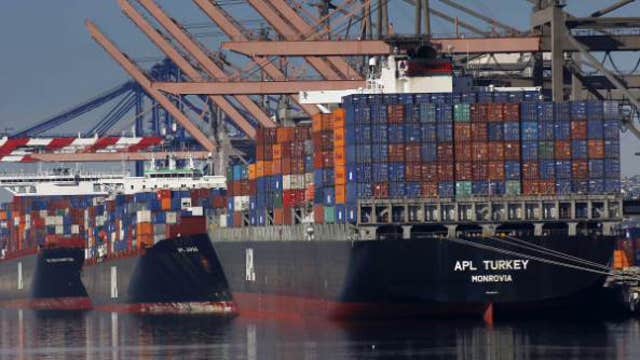As Imports Surge, U.S. Trade Gap Widens to '08 Level
The U.S. trade deficit surged to its highest level in nearly 6-1/2 years in March as imports rebounded strongly after being held down by a labor dispute at key West Coast ports, suggesting growth contracted in the first quarter.
The Commerce Department said on Tuesday the deficit on the trade balance jumped 43.1 percent to $51.4 billion, the largest since October 2008. It was the biggest percent change rise since December 1996.
February's shortfall was revised to $35.9 billion from a previously reported $35.4 billion. Economists polled by Reuters had forecast the trade deficit rising to $41.2 billion.
When adjusted for inflation, the deficit widened to $67.2 billion in March, the largest in eight years, from $51.2 billion the prior month.
March's trade gap was far larger than the $45.2 billion deficit the government assumed in its snapshot of first-quarter gross domestic product published last week.
In that report, the government estimated trade sliced off 1.25 percentage points from GDP, helping to pull down growth to a 0.2 percent annual pace. The economy expanded at a 2.2 percent rate in the fourth quarter.
With March's trade deficit coming in bigger than assumed, growth is likely to be revised down to show a contraction when the government publishes its second GDP estimate later this month.
The now-settled labor dispute at the West Coast ports significantly slowed imports and exports at the start of the year. The dollar, which has gained about 12 percent against the currencies of the United States' main trading partners since last June, has also weighed on trade.
In March, imports jumped 7.7 percent, the largest increase on record, to $239.2 billion. Some of the imports likely ended up in inventories, which in the first quarter recorded their biggest increase since the third quarter of 2010.
Imports of food and capital and consumer goods were the highest on record, while imports of industrial supplies and materials were the lowest on record.
Imports of petroleum products hit a record low, highlighting lower crude oil prices and increased energy production in the United States, which has reduced the country's dependence on foreign oil.
Exports increased 0.9 percent to $187.8 billion in March.
Petroleum exports were the lowest since February 2011. Exports to the European Union rose 8.6 percent, with those to Germany reaching their highest level since October 2008.
The United States sold the fewest amount of goods and services to Brazil since April 2010. Exports to Canada and Mexico - the main U.S. trading partners - rose in March.
Exports to China increased 13.6 percent, while imports from that country jumped 31.6 percent. That left the politically sensitive U.S.-China trade deficit at $31.2 billion, up 38.6
percent from February.
(Reporting by Lucia Mutikani; Editing by Paul Simao)




















